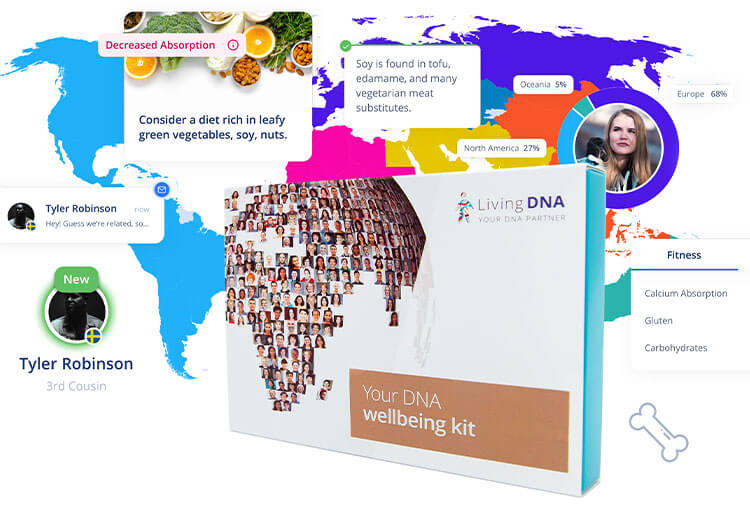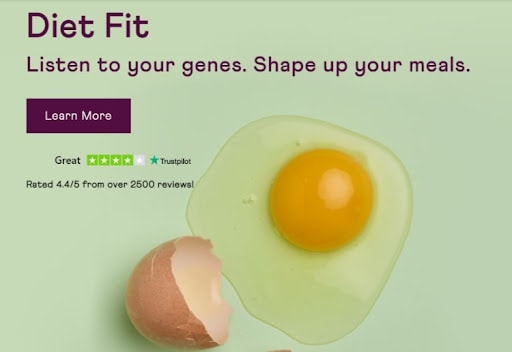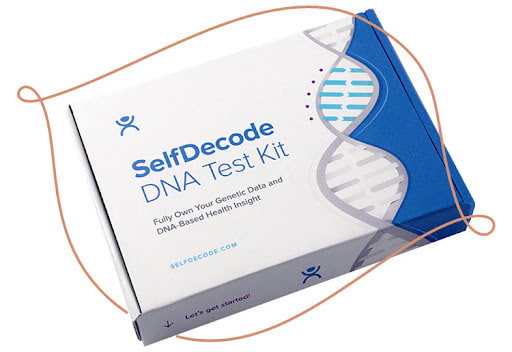Can DNA Testing Help You Lose Weight?
While choosing a diet plan based on your genetic makeup may seem somewhat too futuristic to be real, it’s really not a major stretch of the imagination to consider there being a genetic tie to weight gain. After all, obesity has already been proven to have genetic variants. So, these tests just take things one step further, exploring your body type and your genetic makeup to determine what your triggers are.
How Does DNA Testing Work for Weight Loss?
The main concept behind DNA testing for weight loss is that your body responds differently to various stimulants (specifically food and exercise) than someone else’s body. For example, your body might start conserving fat when it hits a certain caloric deficiency, storing fat after eating less saturated fat, or needing more carbs after doing certain exercises than someone else.
Researchers can tell you which foods to trim down and which ones actually prevent weight loss, how much of each sort of food your body needs to reach the optimal BMI, and even which exercises will benefit you the most.
The results can tell you if your body is predisposed to certain foods, quantities, and combinations, and the reports will provide you with food and fitness recommendations, menu plans, and meal ideas based on your DNA results and as many as 32 different genetic markers. The suggestions are made up of foods that will help you lose weight because of the way your body in particular responds to those foods.
Should You Take a DNA Test Before Planning a Diet and Why?
You’re unique, and your genetic makeup is different than anyone else’s too. So, it’s logical that the way your body reacts to foods and fitness will differ from the reactions of your friend or neighbor. If you are considering which diet is right for you, it’s a good idea to take a DNA test beforehand. The test results can help you determine power foods that you’ll want to stock up on as well as which foods to avoid.
By consulting your genetic makeup, you can choose a diet plan that is more beneficial for you instead of just basing it on what looks good for the average person.
Can DNA Testing Help for Fitness?
Since your DNA sequencing holds loads of information about you including your genetic disposition toward diseases, sleep patterns, and tribal origins, it’s not surprising that researchers are finding the information you need to understand which foods are best for your body too.
What’s more, DNA testing is being used to determine which exercise routines will yield the most results for you as well. The truth is your body will respond to the right workout routine for it, and not respond as well to the wrong one. So, using your genetic map, you can determine which exercises will get your body moving so that you can maximize that gym time and sculpt your body the way you want to.
DNA & Your Health
DNA testing isn’t just about finding your roots or choosing the right diet for you. In fact, it's a positive idea if you have questions about your health in general. While looking at your genomes under a microscope, researchers can find important information regarding your health that can help with making healthier decisions and even life-altering choices.
For example, 23andMe has an in-depth package that tests for genetic health risks, signs that you are a carrier of debilitating diseases such as Celiac or Parkinson's, and even your propensity to lose your hair earlier.
DNA testing is not a foolproof way to lose weight. There's still significant research to be done in order to fully maximize this type of diet planning, and even with the most accurate results, at the end of the day, you will still have to practice self-control and discipline if you really want to lose weight and get fit. Using DNA testing for weight loss can help guide you in the right direction and help you understand why certain diets just aren’t working for you.
How can a DNA weight loss test help you?
Everyone’s DNA is different. Thus, it makes sense that everyone’s diet should be also. DNA weight loss testing can help give individualized insight into the effects of certain foods, nutrients, and exercise on your body and weight.
As a dietitian, the reason I always schedule follow-ups with clients is that these genetic variations exist. Nutrition counseling requires a level of trial and error and, if my initial advice isn’t showing results, we have to try other options.
With DNA testing, you can skip the trial and error in favor of a quicker journey to success.
What a DNA Test for Weight Loss Can Tell You
The Best DNA Health Test has yet to be crowned. However, if you know what to look for in a test, you’ll be able to shut out the conflicting health advice presented in the media. Instead, you’ll have recommendations that work specifically for you.
DNA tests can reveal your level of risk for certain food sensitivities, how your body processes caffeine, the best diet type for weight loss goals, and—incredibly—whether your genes make you susceptible to gaining unwanted weight.
You can even find out if your exercise routine is conducive to weight loss. We dietitians marvel at how genetic markers can provide such information.
Why take a DNA test for weight loss?
In an age of social media, almost everyone claims to be an expert on diet and exercise. This makes it difficult for the average person to navigate recommendations.
Just because something worked like a charm for Ally on Instagram doesn’t mean it will work for you, and it could leave you feeling discouraged and defeated when it doesn’t.
Taking a DNA test for weight loss can give you definitive guidelines to help you lose weight once and for all, for a relatively affordable investment and with minimal effort.
What to look for in the best DNA test for weight loss
Cost
A DNA health test could run you anywhere from $100 to $1,000. It depends on what you’re looking for! Many companies allow you to customize the tests run on your sample, so you only pay for the results you want. Others have a base cost for the DNA kit with an add-on price for other specific tests you may want.
Our review can help you determine which of the tests that reflect your personal goals are also within your budget.
Accuracy
Without being a geneticist, there’s no concrete way to tell if your test is accurate. FDA approval is a good sign. Accuracy is also boosted when companies use a worldwide pool of genetic data, rather than a local pool.
Look for companies that reinforce their testing approach with reference to peer-reviewed scientific research. Just know that no scientific test is ever 100% accurate. However, this doesn’t mean valuable information can’t be drawn from the results.
Privacy
Having your genetic data floating around cyberspace is about as vulnerable as you can get. So, it’s important to know your data is protected. Choose a company that uses security measures to protect your data, such as encrypted software and HIPAA-compliant data collection. Also, look for confirmation on the website that the company will not sell or share your data with third parties.
Speed
On average, results become available four weeks after sending in your sample. Some companies can take as long as 12 weeks, but it may depend on the complexity of your selected tests. Remember, all DNA testing companies are testing thousands of samples at a time with only one or two labs.
For faster results, choose a company like Gene Food that promises some test results within five minutes. Orig3n also offers an app that allows you to access your results from your phone, rather than waiting for your mail.
DNA tests don't directly help with weight loss, though there are new DNA tests on the market that give you insight into your own unique metabolism and eating habits. These tests can help you get a better view of your body's chemistry, which in turn can help you take a more successful approach to dieting.
Your DNA contains key information that can determine your body's metabolism, including how you burn calories and store fat.
DNA diet plans use genetics to help you understand your body's relationship to food. By understanding your metabolism, eating habits, and physiology, you can then construct a diet that best optimizes your own metabolism.
The best DNA tests for health can tell you what specific nutrients you need, whether you have lactose intolerance or a predisposition to certain food allergies, what exercises are most effective for your body, and how difficult it may be to lose weight or gain muscle compared to others.
From my experience, diet and fitness DNA tests vary in accuracy. It really depends on how many biomarkers your chosen test sends to the lab, how many DNA testing companies your data is sent to, and how much population data is available to compare your genetic information against.
The price of testing kits depends on the comprehensiveness of the testing, how fast you want your results, and the type of test results you wish to receive. Keep in mind, the best DNA test for health isn’t always the most expensive. Nutrition and exercise genetic testing will typically cost you around $100-$1,000.
The easiest and most common sample needed is a cheek swab, which is relatively quick and painless. Some companies may ask for one or more samples of your saliva. However, other companies require a blood sample for certain results and will prompt you to travel to a lab for this
Recent research indicates that genetics do play a major role in weight management. Certain ethnicities may be more prone to chronic diseases like insulin resistance, which can make weight loss harder. Genes also play a role in factors such as differences in appetite and body fat distribution.





.20181204110946.png)














